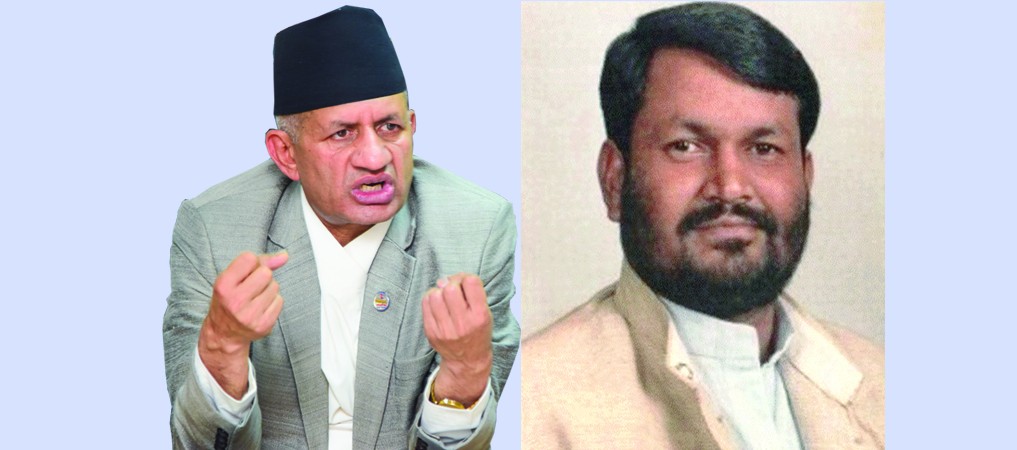Govt all set to rescue Nepalis from Gulf

By Arpana Adhikari
Kathmandu, Jan.9: Following the escalating tension between the United States and Iran, the government has initiated its move to bring Nepali nationals back home from Iran and Iraq.
International media have reported that Iran fired more than a dozen ballistic missiles at the two Iraq-based US Base camps on Wednesday, in retaliation for the US killing top Iranian commander.
It is still unclear whether there have been any casualty, but a preliminary report of US has suggested no casualty, international media reported.
Spokesperson at the Ministry of Foreign Affairs (MoFA) Bharat Raj Poudyal said till Wednesday evening no casualty of Nepali nationals was reported by the embassy responsible to look after Iraq.
After Iran’s move, tension between the two countries is expected to worsen further, provoking conflict.
Considering the situation in the Persian Gulf, the government has taken measures to rescue Nepali nationals working in Iraq and Iran in case of emergency. The government has initiated an effort to protect its citizens who are at risk and bring them home.
The government has asked the concerned embassies to alert the Nepali nationals to contact them if the situation worsened.
Four days ago, Minister for Foreign Affairs (MoFA) Pradeep Kumar Gyawali had issued a circulation to the concerned embassies and their ambassadors to keep high alert over the safety of its citizens.
The circulation was issued after Minister Gyawali, Minister for Labour, Employment and Social Security (MoLESC) Rameshwor Ray Yadav and chiefs of the concerned divisions discussed the possible threat to the Nepali nationals working in the region.
During the meeting, secretaries of MoFA Shanker Das Bairagi and of the MoLESC Binod KC were present.
The meeting asked the concerned embassies to find out the actual numbers of Nepali nationals working in the region. Minister Gyawali has been in regular contact of the designated embassies and acquiring information about the condition of the Iran and Iraq, said Sudan Gyawali, media advisor to Minister Gyawali
“The minister has asked the missions to make necessary arrangements so that they can rescue Nepalis immediately in case of the emergency.”The minister has also asked the missions to ascertain the numbers of Nepali nationals in Iran and Iraq. Nepal has imposed a ban on sending its nationals to Iraq, Iran and other conflict-torn countries where they can often face danger or exploitation.
However, there are a number of Nepali nationals illegally working in Iran and Iraq, said MoFA Spokesperson Poudyal, adding that in the case of a war in the region, the government was making an effort to bring its citizens home.
“If something goes wrong, then the ministry is aware about the safety of its people and the government has been working accordingly,” said Poudel while talking to The Rising Nepal.
Spokesperson of the Ministry of Labour Dr. Narayan Regmi said, “The government does not issue work permit to its citizens to work in Iraq and Iran. But many people had reached these countries through illegal means.”
“Due to this, it is difficult to estimate the actual number of Nepali nationals working in the region. The persons who came into the contact of the embassies have claimed that a large number of Nepali migrant workers are working in Iraq,” said Regmi.
Some female migrant workers have also reached Iraq as domestic helpers, said Regmi, adding that “We came to know that there are a few Nepali nationals in Iran as well.”
The government has already assigned the Nepali Embassies in Kuwait and Pakistan, which are responsible to look after Iraq and Iran respectively, to find out the actual number of Nepali in the two countries, he added. Regmi said in cases of emergency, a separate team would be formed in the coordination of MoFA, MoLESC and Home Ministry.
Following the circulation of the government, Nepali Embassy in Kuwait has issued a notice for Nepali nationals and started collecting their data, said Ambassador Durga Prasad Bhandari.
Recent News

Do not make expressions casting dout on election: EC
14 Apr, 2022
CM Bhatta says may New Year 2079 BS inspire positive thinking
14 Apr, 2022
Three new cases, 44 recoveries in 24 hours
14 Apr, 2022
689 climbers of 84 teams so far acquire permits for climbing various peaks this spring season
14 Apr, 2022
How the rising cost of living crisis is impacting Nepal
14 Apr, 2022
US military confirms an interstellar meteor collided with Earth
14 Apr, 2022
Valneva Covid vaccine approved for use in UK
14 Apr, 2022
Chair Prachanda highlights need of unity among Maoist, Communist forces
14 Apr, 2022
Ranbir Kapoor and Alia Bhatt: Bollywood toasts star couple on wedding
14 Apr, 2022
President Bhandari confers decorations (Photo Feature)
14 Apr, 2022











